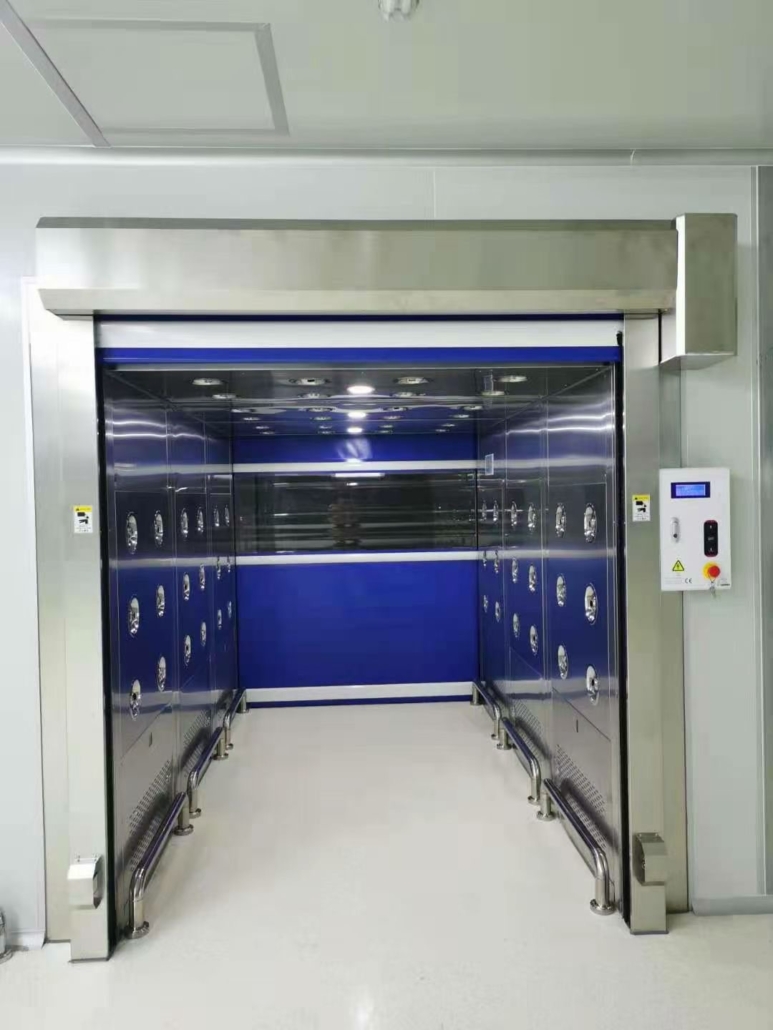In electronic, semiconductor, pharmacy, and food manufacturing industries, It is essential for product quality, safety, and regulatory compliance with ISO or GMP standards. The air shower or air lock plays a crucial role in contamination control and ensuring the integrity of critical processes.
1. Electronic Manufacturing:
- Role: Air showers serve as vital role in electronic manufacturing facilities, preventing contaminants from entering cleanroom environments where sensitive components are assembled. They ensure that electronic devices meet performance standards by minimizing the risk of particle-induced defects.
- Suggestions: Implementing advanced air shower systems with particle monitoring capabilities can provide real-time feedback on cleanliness levels, enabling proactive maintenance and contamination control. Additionally, integrating air shower rooms with cleanroom automation systems streamlines workflow processes and minimizes human error.
2. Semiconductor Manufacturing:
- Role: In semiconductor fabrication facilities, where nanoscale components are produced, air shower plays a critical role in maintaining ultra-clean environments. They remove particles from personnel and equipment, preventing contamination that could compromise chip performance and yield.
- Suggestions: Investing in advanced air shower technology, such as ionization systems and ultrasonic atomization, can enhance particle removal efficiency and minimize static charge buildup. Regular training programs for cleanroom personnel on proper gowning and entry procedures further reinforce contamination control efforts.
3. Pharmacy Manufacturing:
- Role: Air shower role is integral to pharmaceutical manufacturing facilities, ensuring that sterile production areas remain free from external contaminants. They safeguard the purity of pharmaceutical products and comply with regulatory standards for Good Manufacturing Practices (GMP).
- Suggestions: Employing air shower rooms with HEPA filtration systems and laminar airflow design optimizes particle removal efficiency and minimizes the risk of microbial contamination. Implementing stringent hygiene protocols, including regular disinfection of air shower surfaces and equipment, further enhances cleanliness and regulatory compliance.
4. Food Manufacturing:
- Role: In food processing facilities, where hygiene is paramount to prevent foodborne illnesses and ensure product safety, air shower serves as critical control points role. They remove contaminants from personnel and equipment, reducing the risk of microbial contamination in food products.
- Suggestions: Utilizing air shower rooms with stainless steel construction and antimicrobial coatings enhances cleanliness and facilitates compliance with food safety regulations. Implementing strict hygiene protocols, such as handwashing and gowning procedures, further minimizes the risk of cross-contamination in food production environments.
Importance Across Industries with air shower:
- Product Quality Assurance: Air showers contribute to maintaining consistent product quality by minimizing the risk of contamination-related defects and ensuring compliance with industry standards.
- Regulatory Compliance: Compliance with regulatory requirements, including ISO cleanroom classifications and food safety regulations, is facilitated by the effective implementation of air shower rooms.
- Operational Efficiency: By reducing the incidence of contamination events and streamlining cleanliness protocols, air shower rooms enhance operational efficiency and minimize production downtime.
In summary, air shower plays a crucial role in electronic, semiconductor, pharmacy, and food manufacturing cleanroom by safeguarding product quality, ensuring regulatory compliance, and optimizing operational efficiency. By implementing tailored solutions and adhering to best practices, manufacturers can effectively leverage air shower tech.


